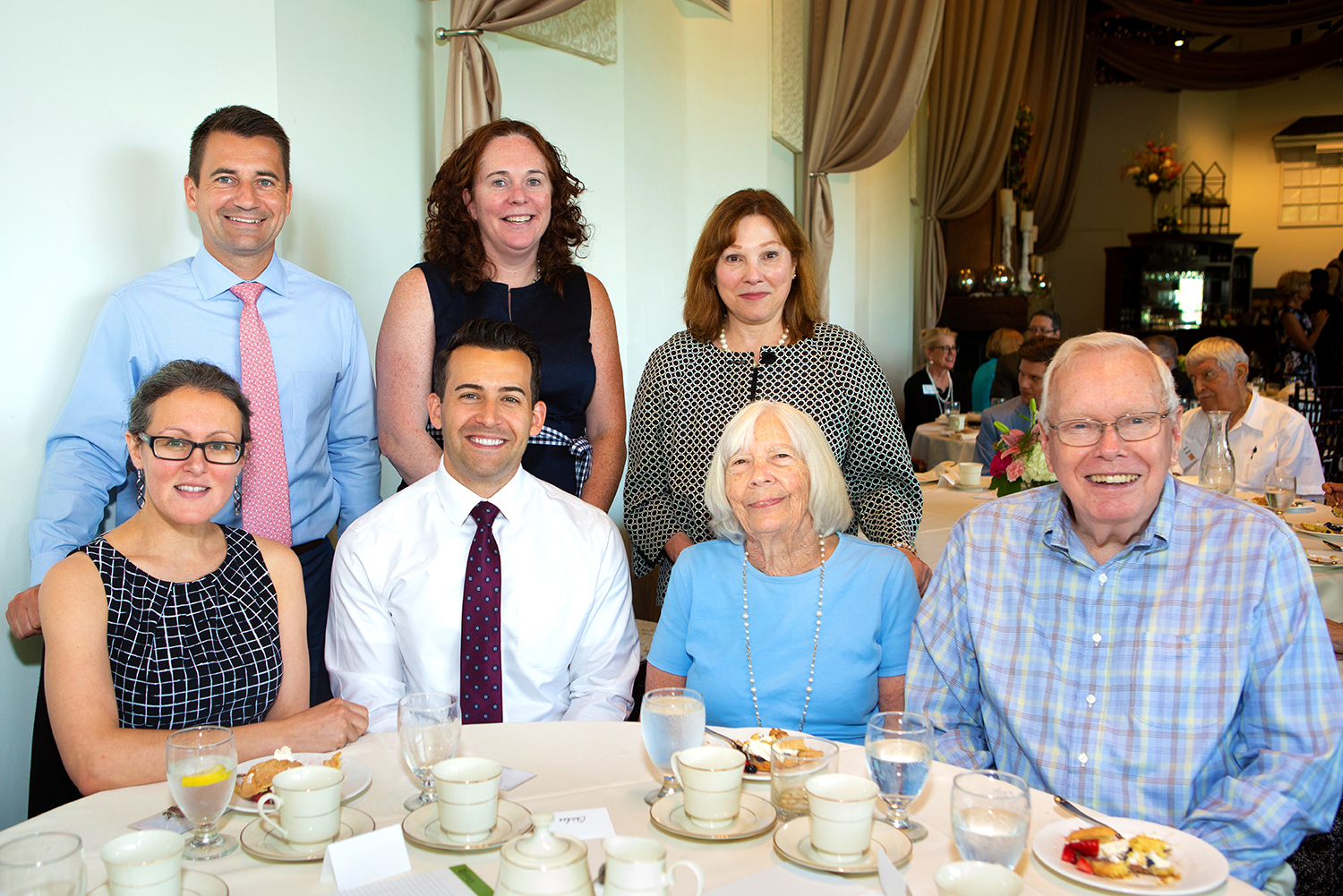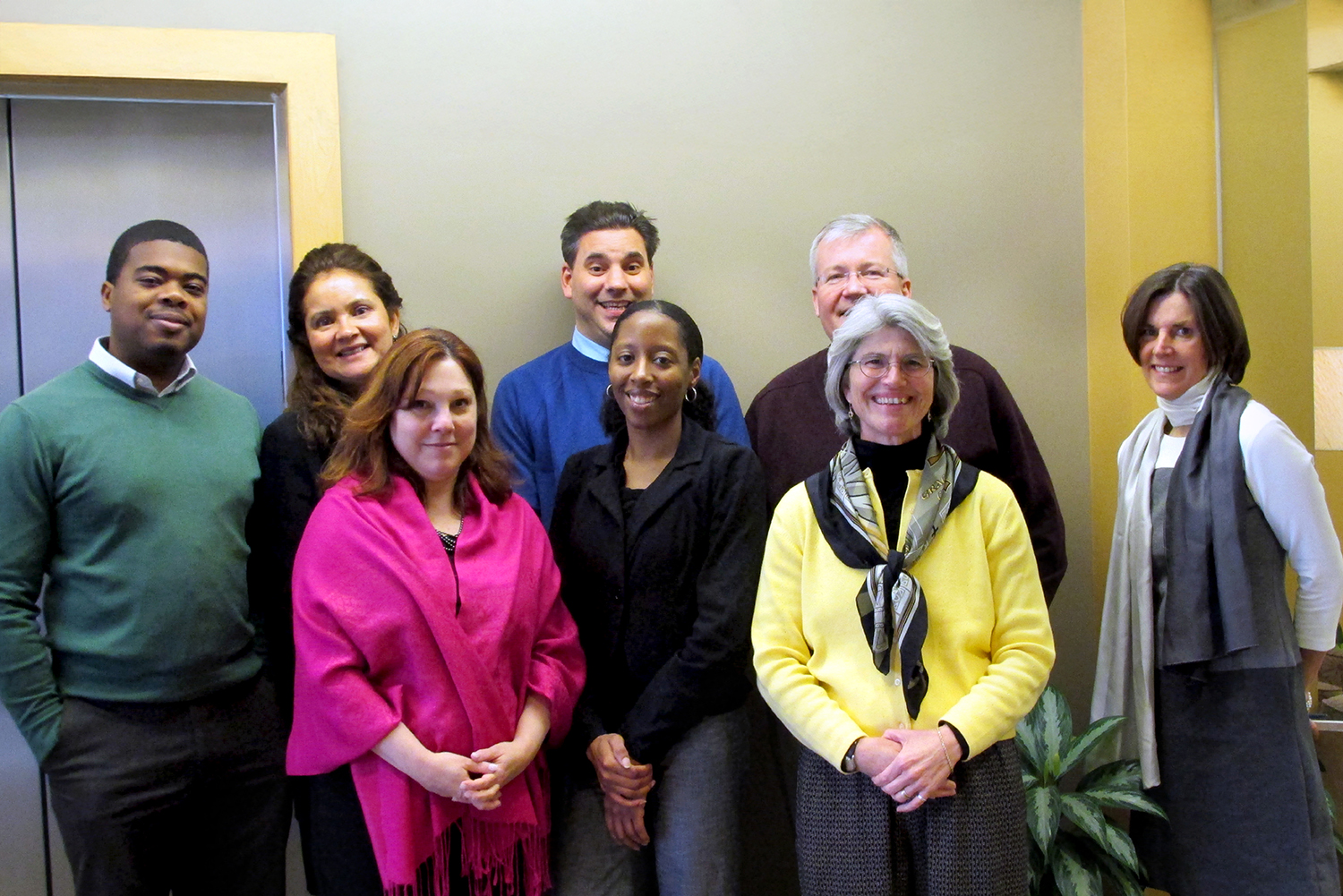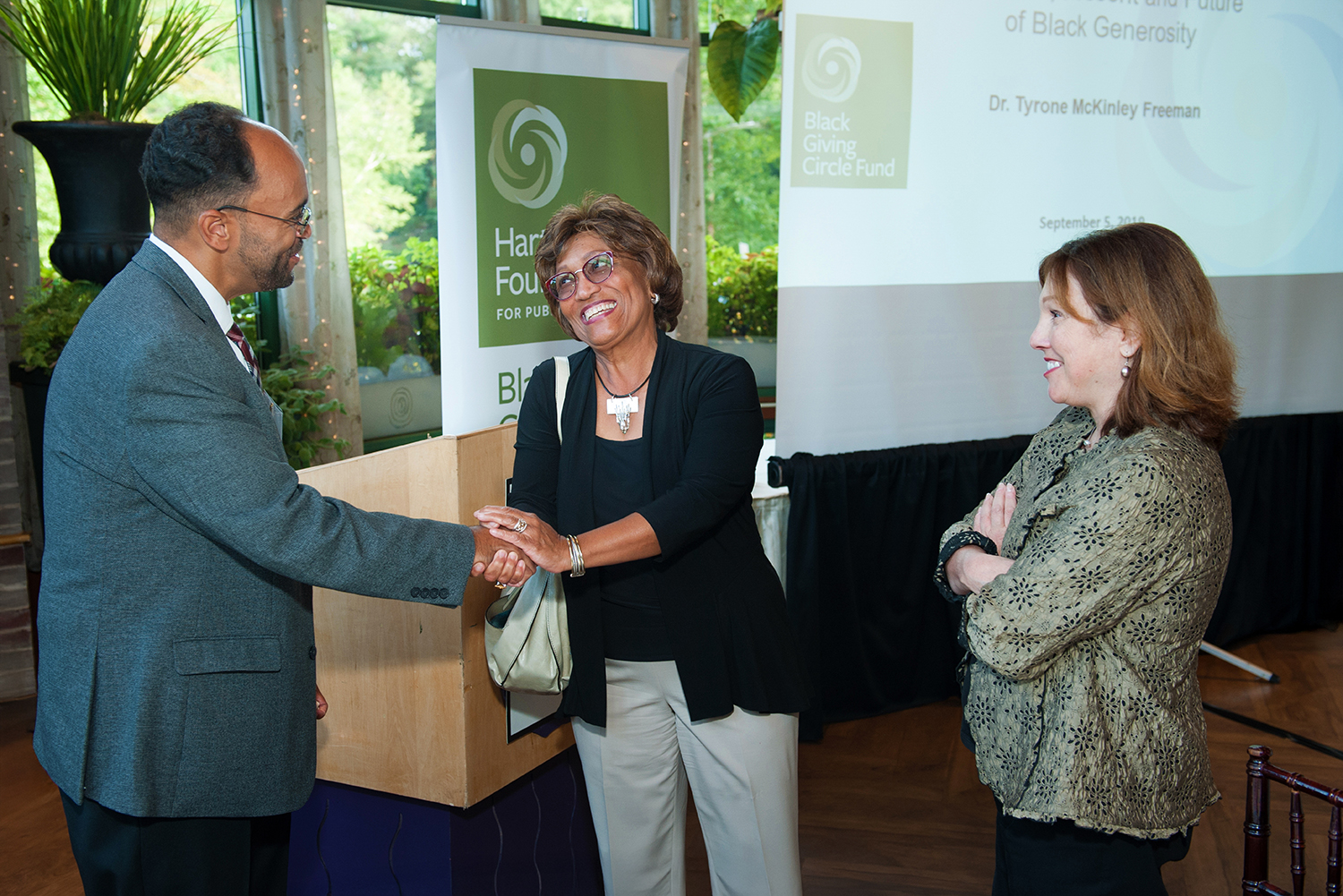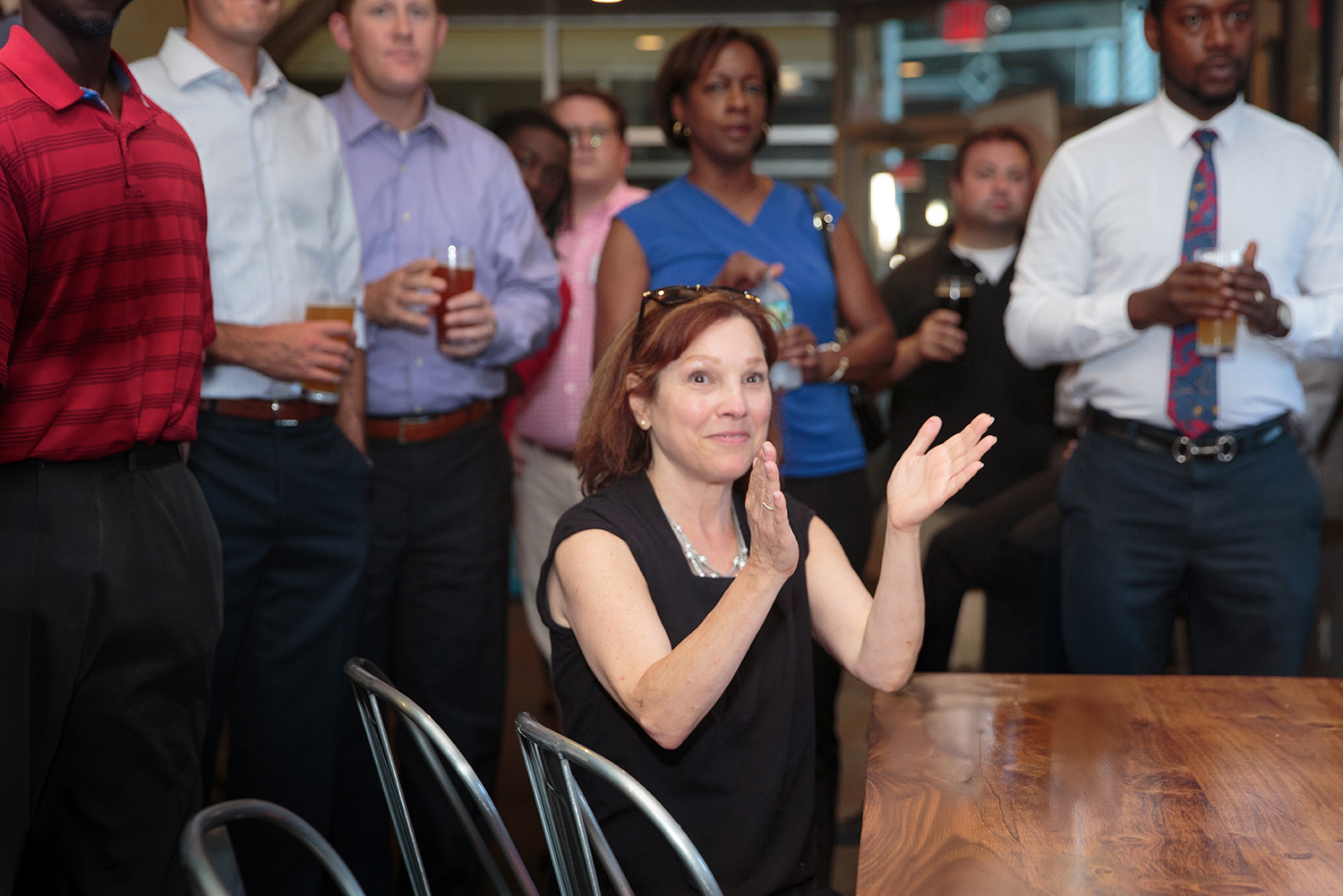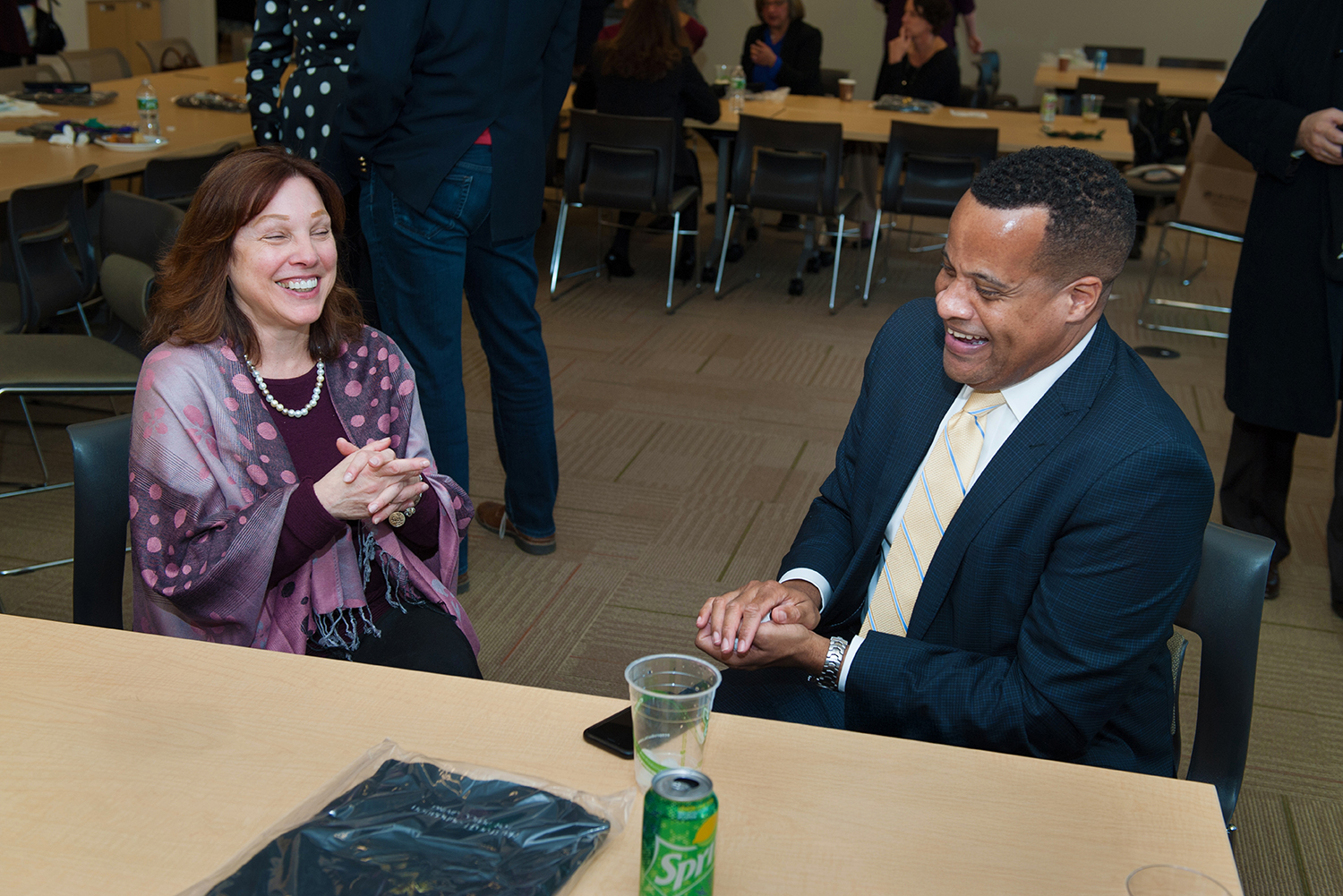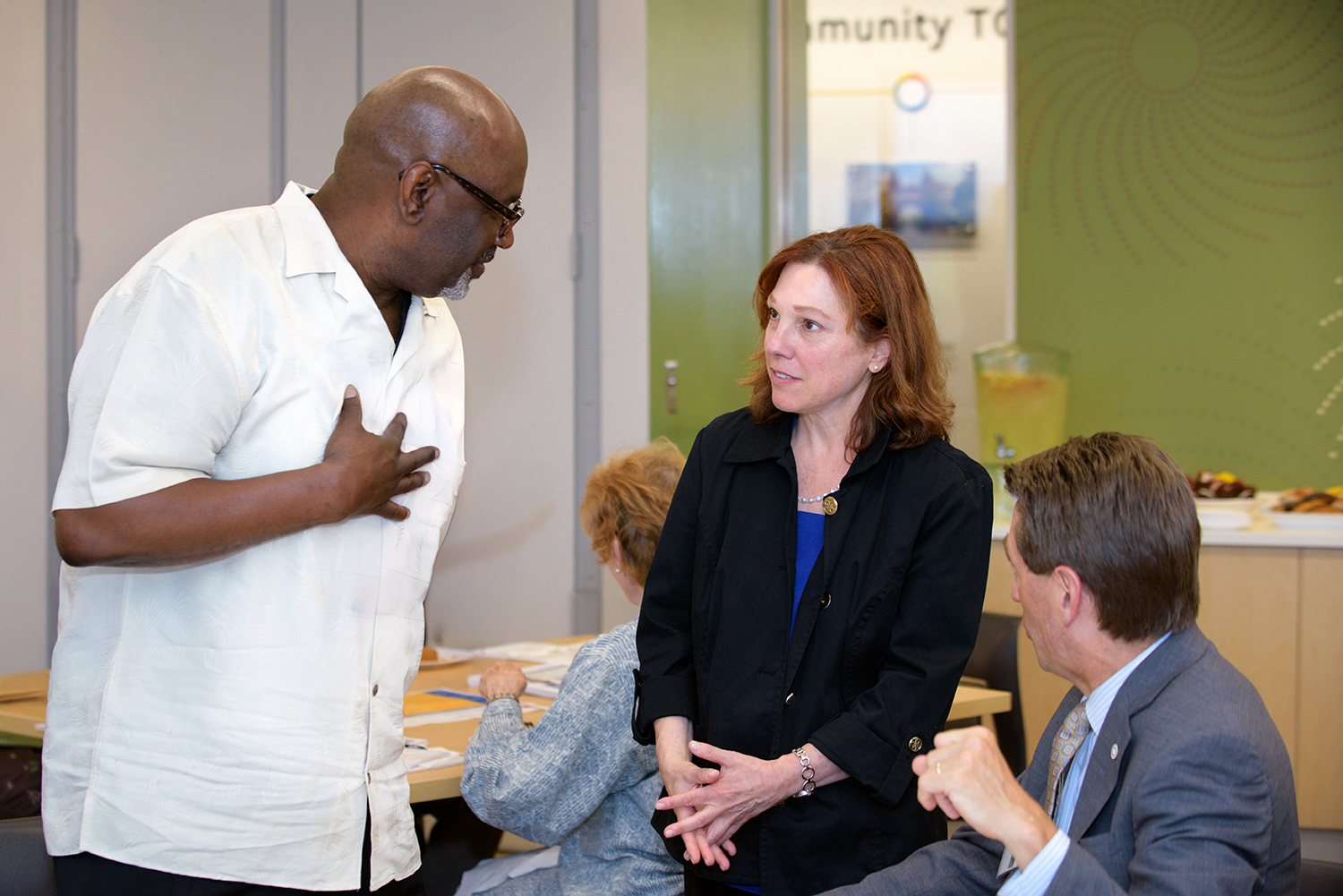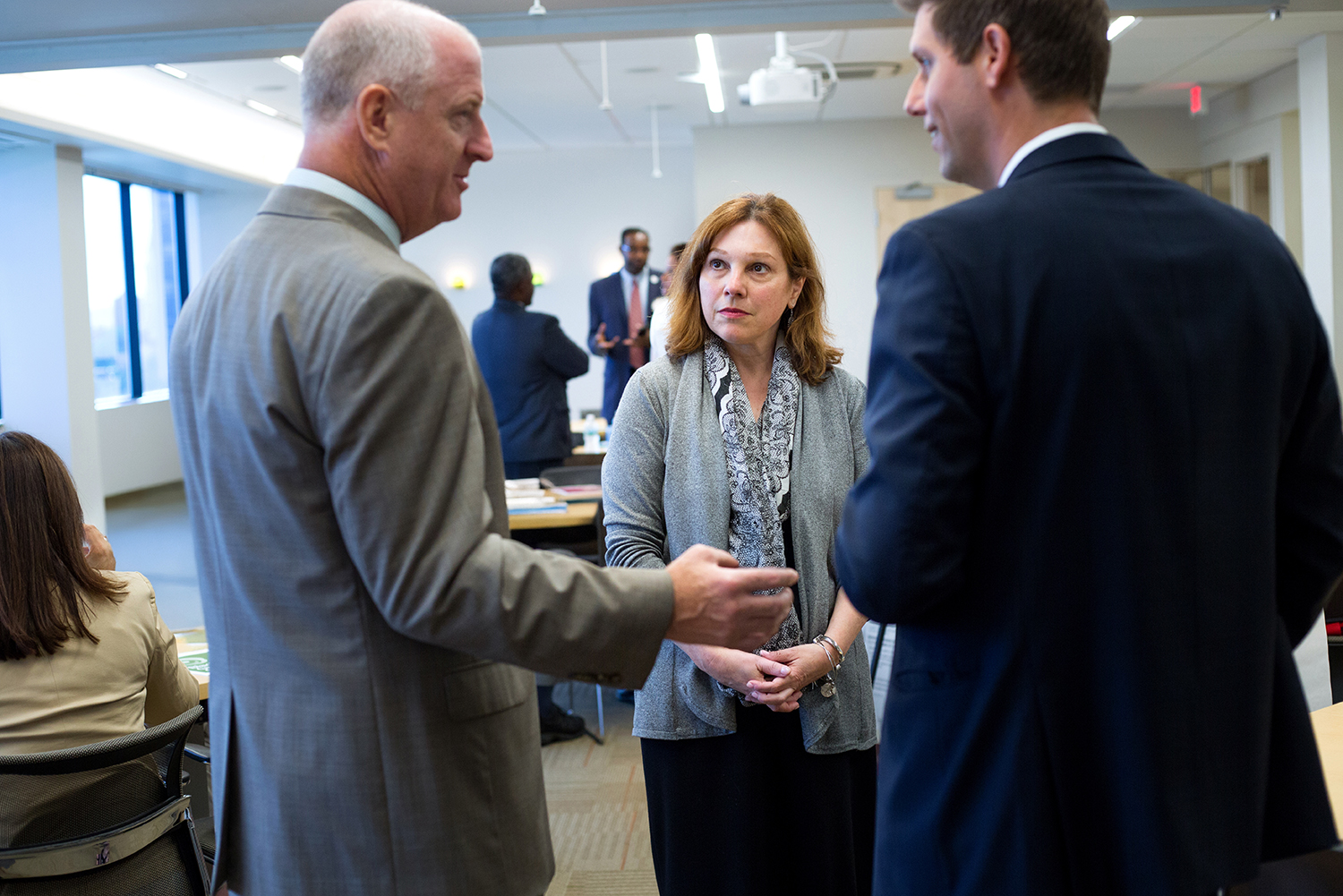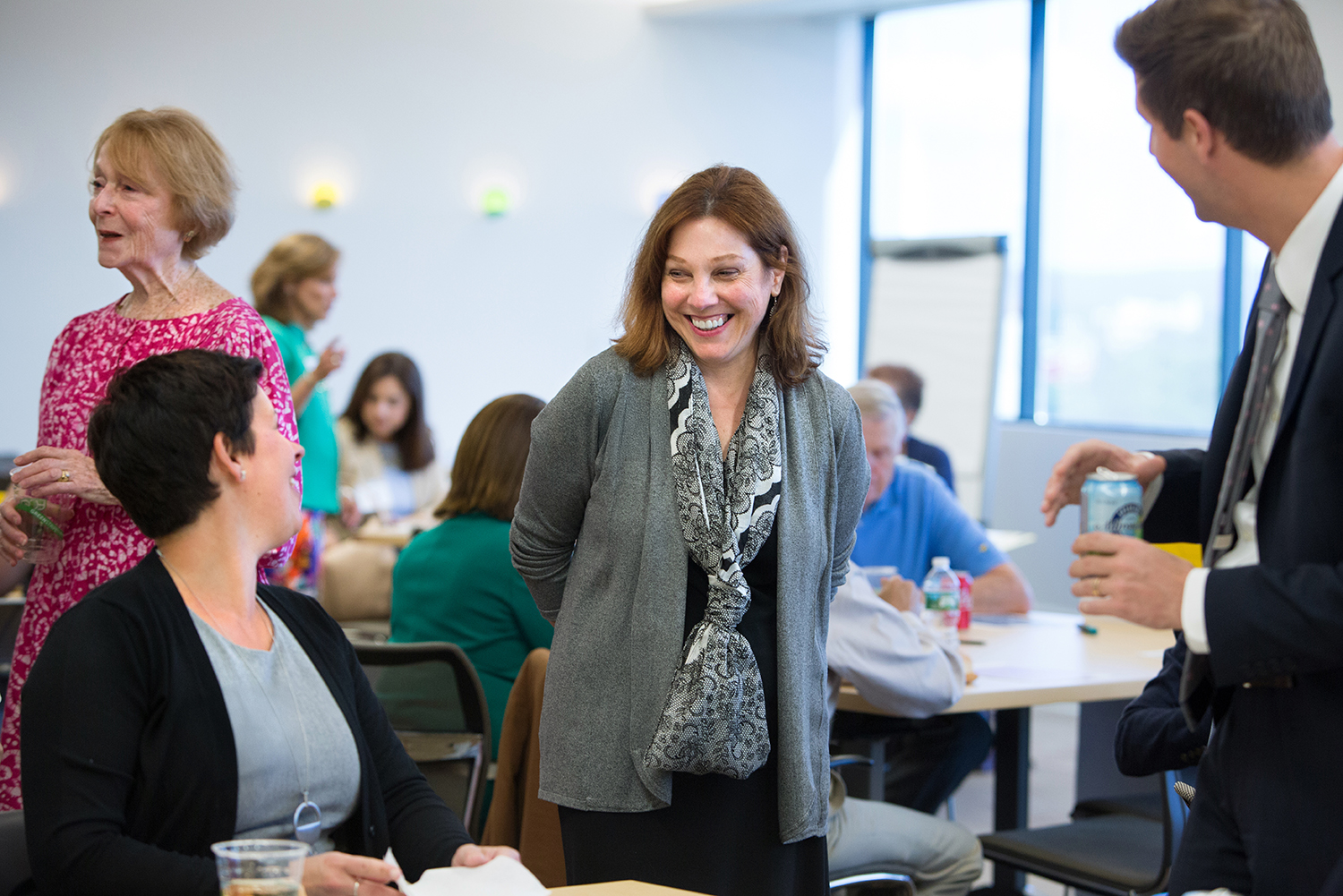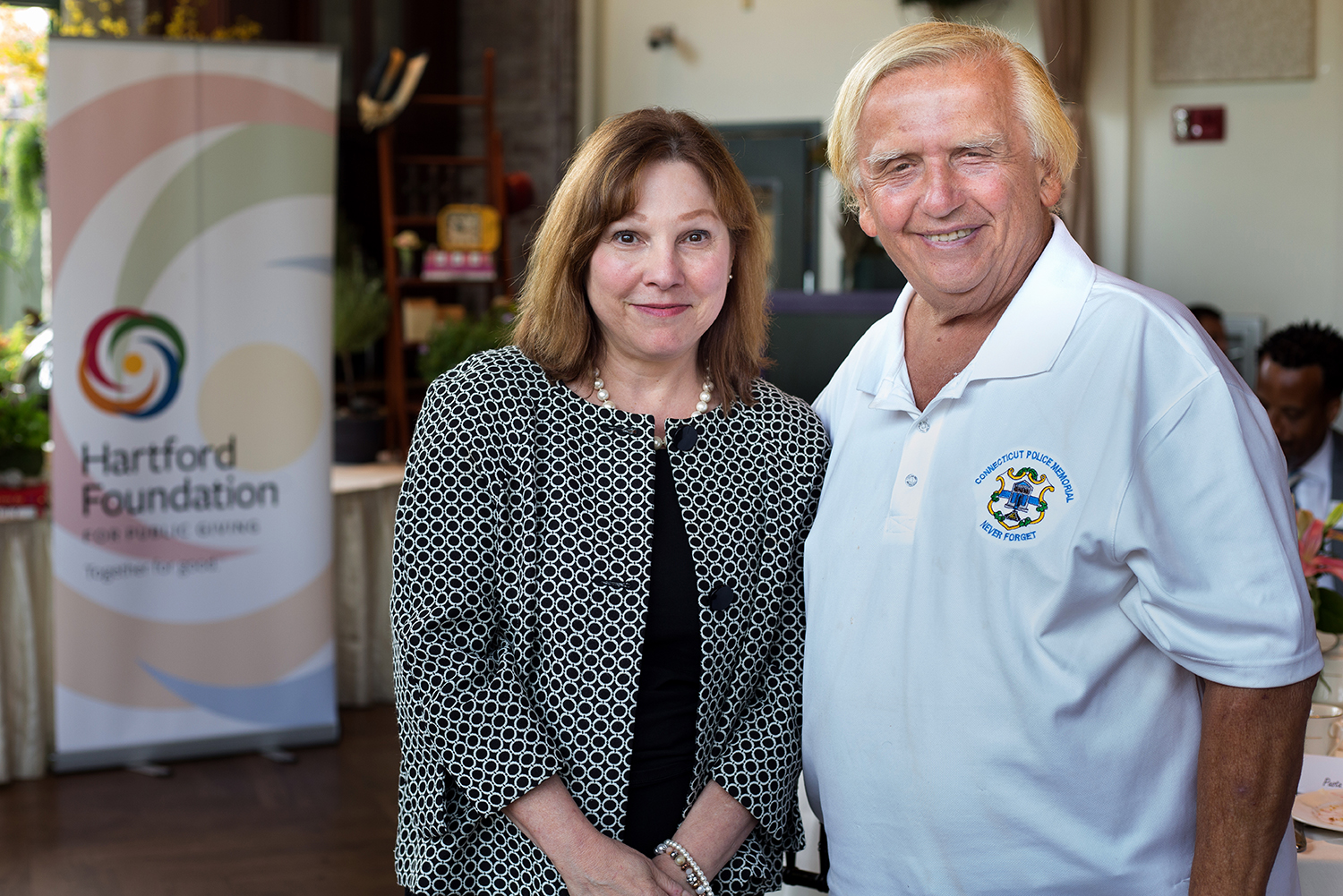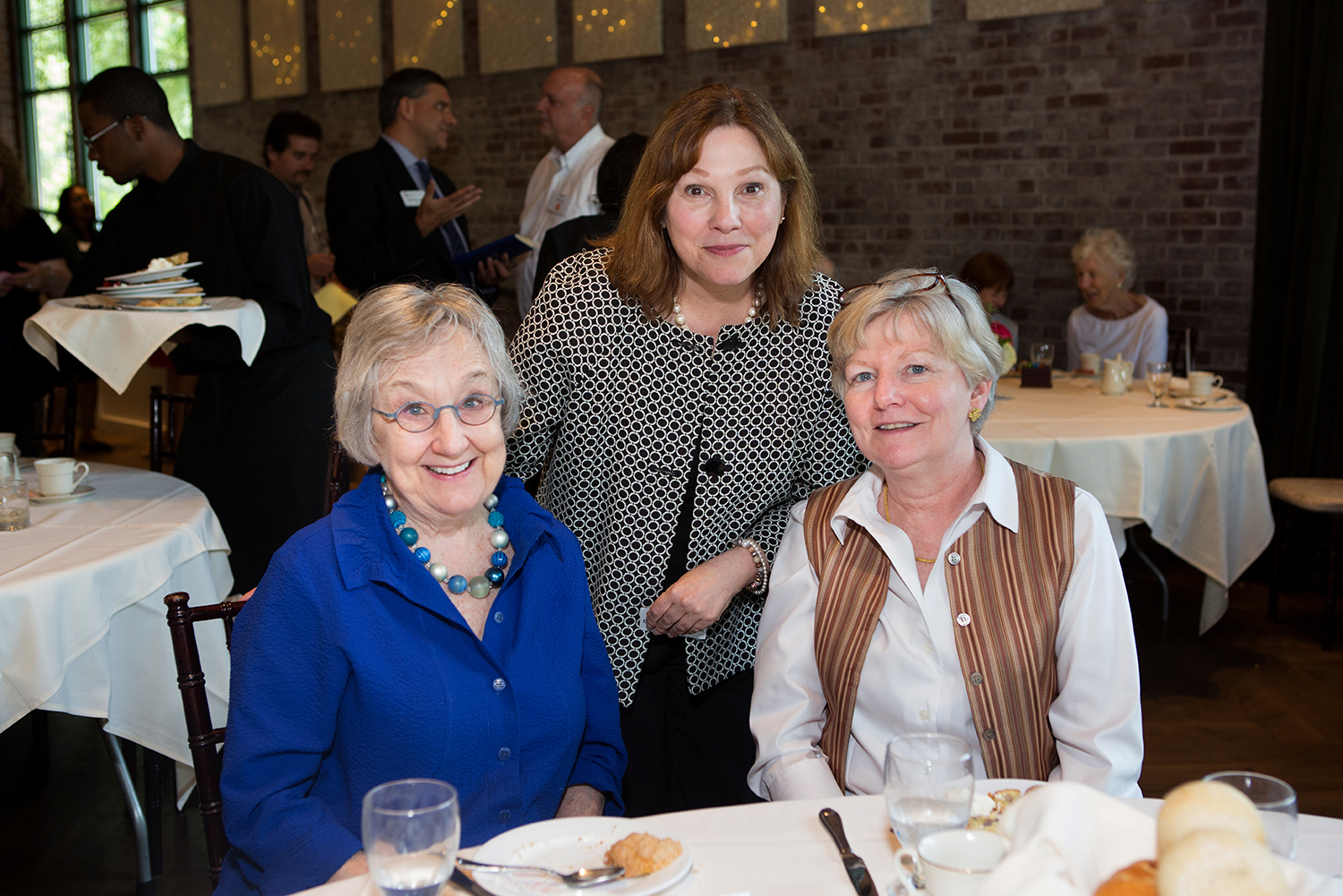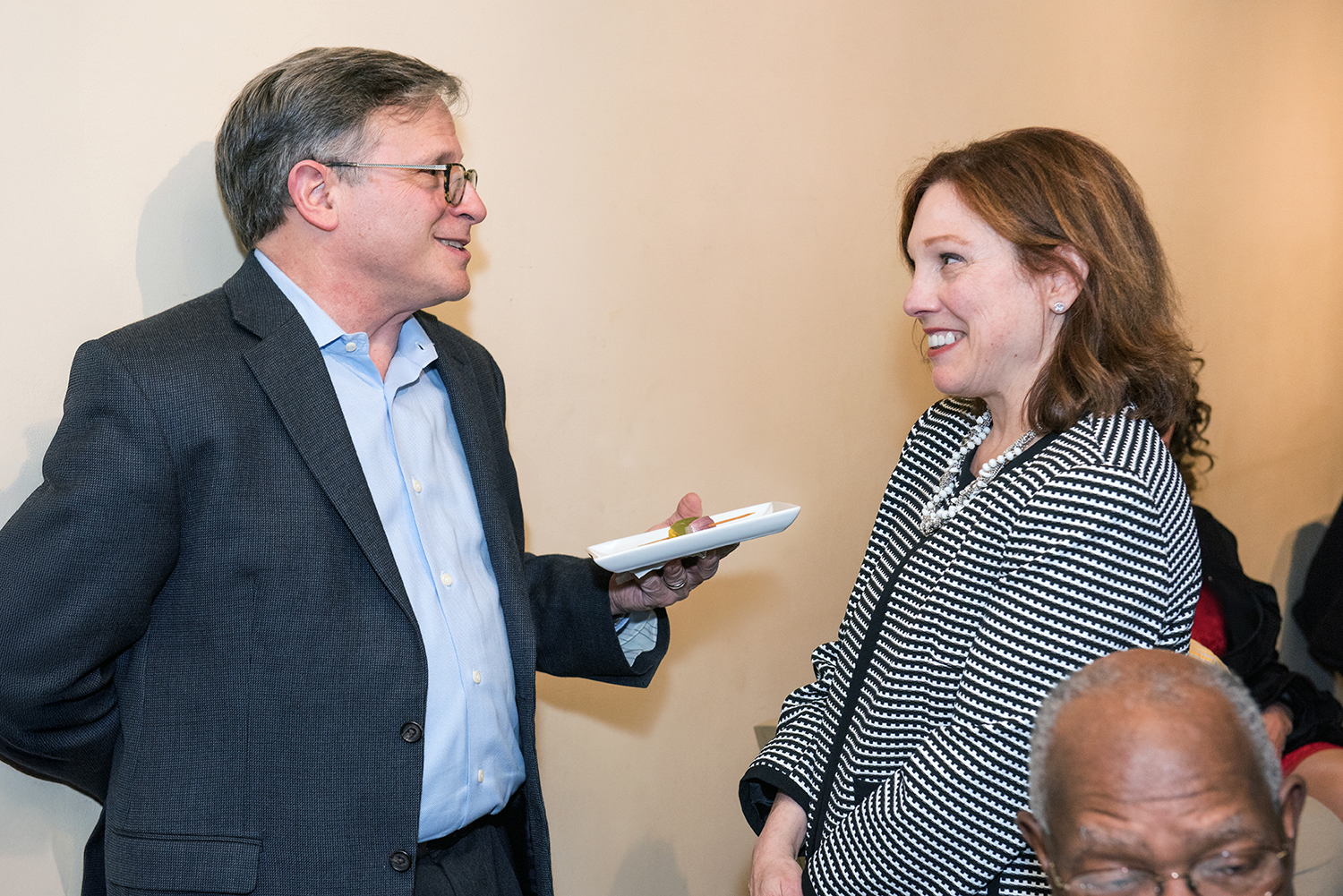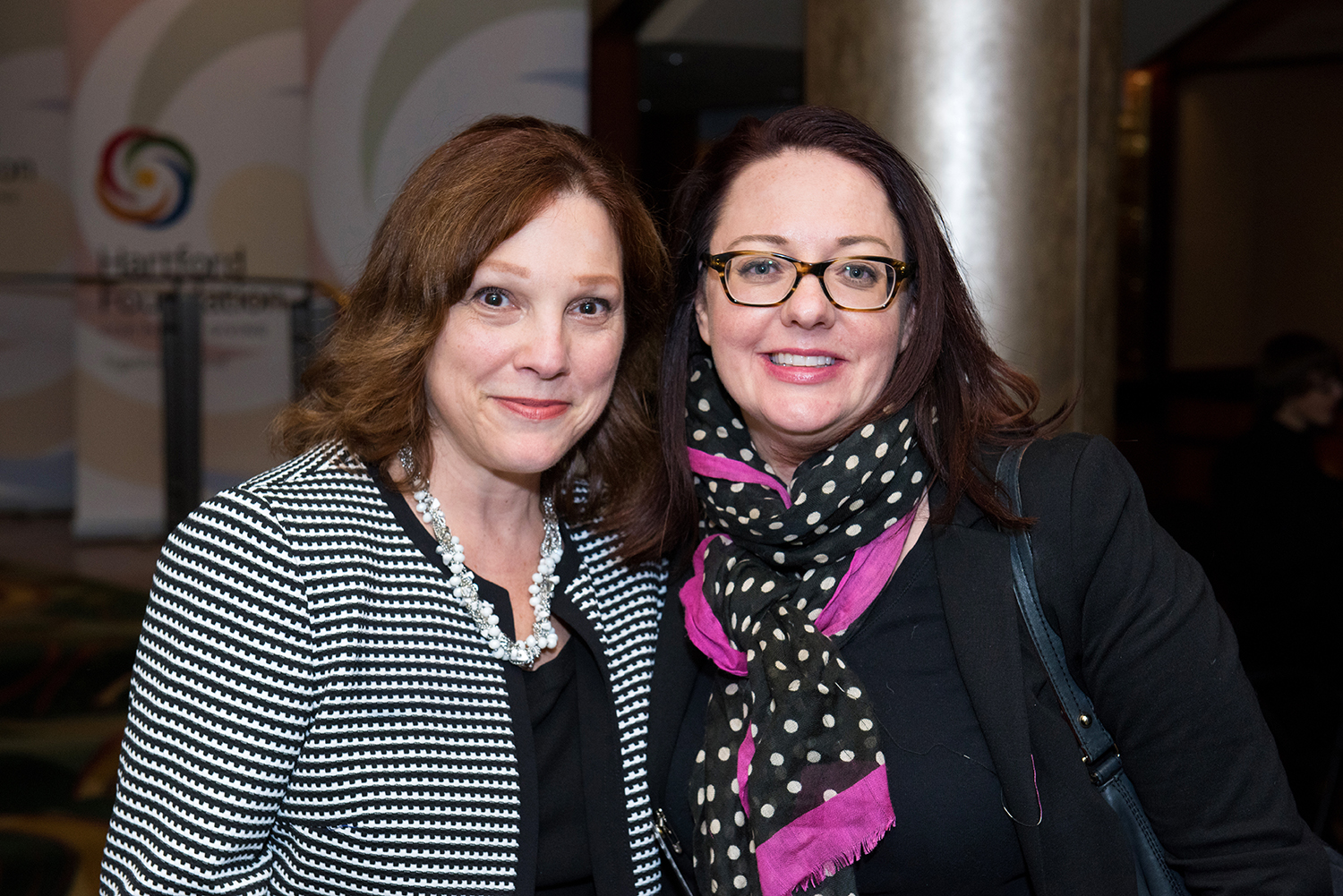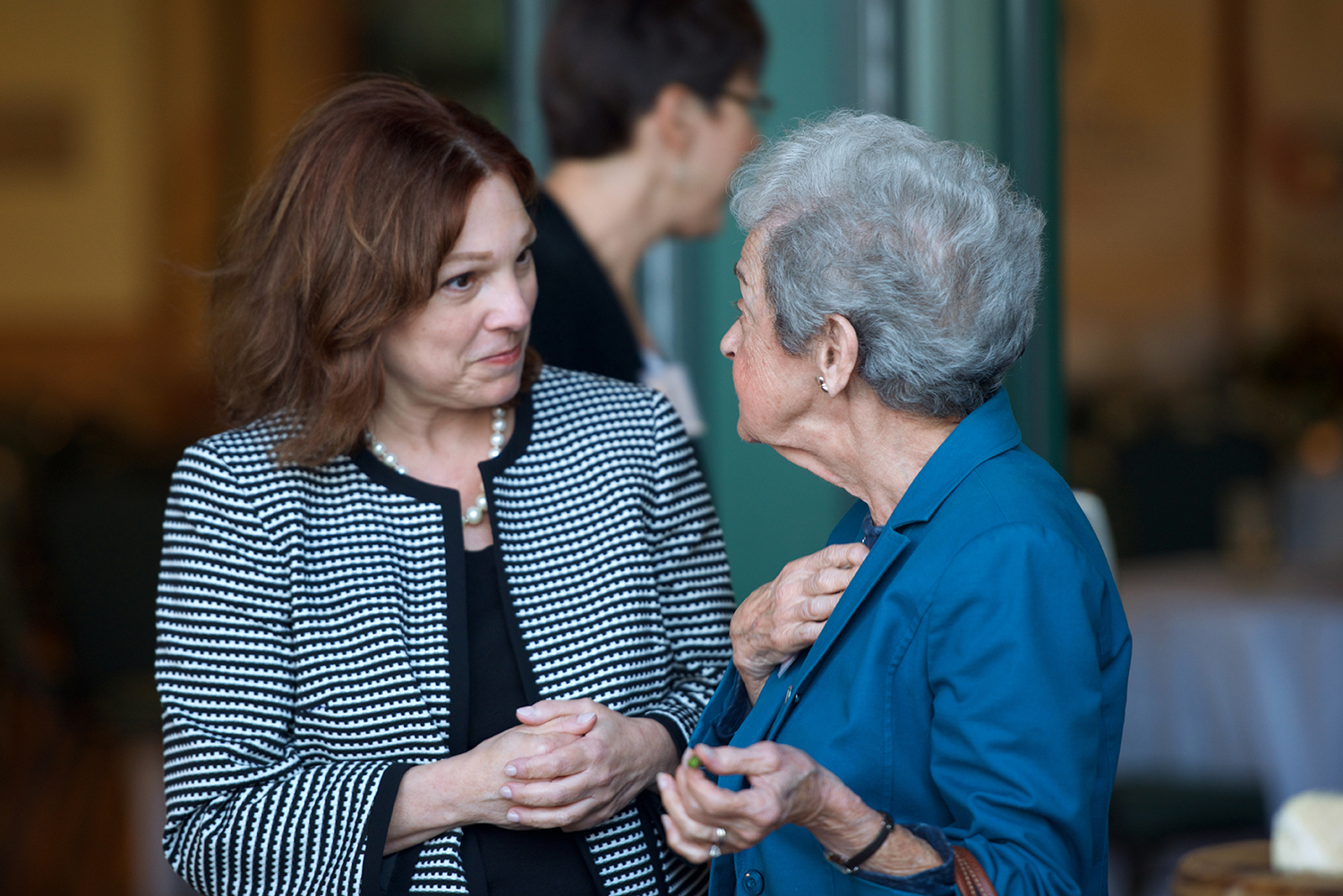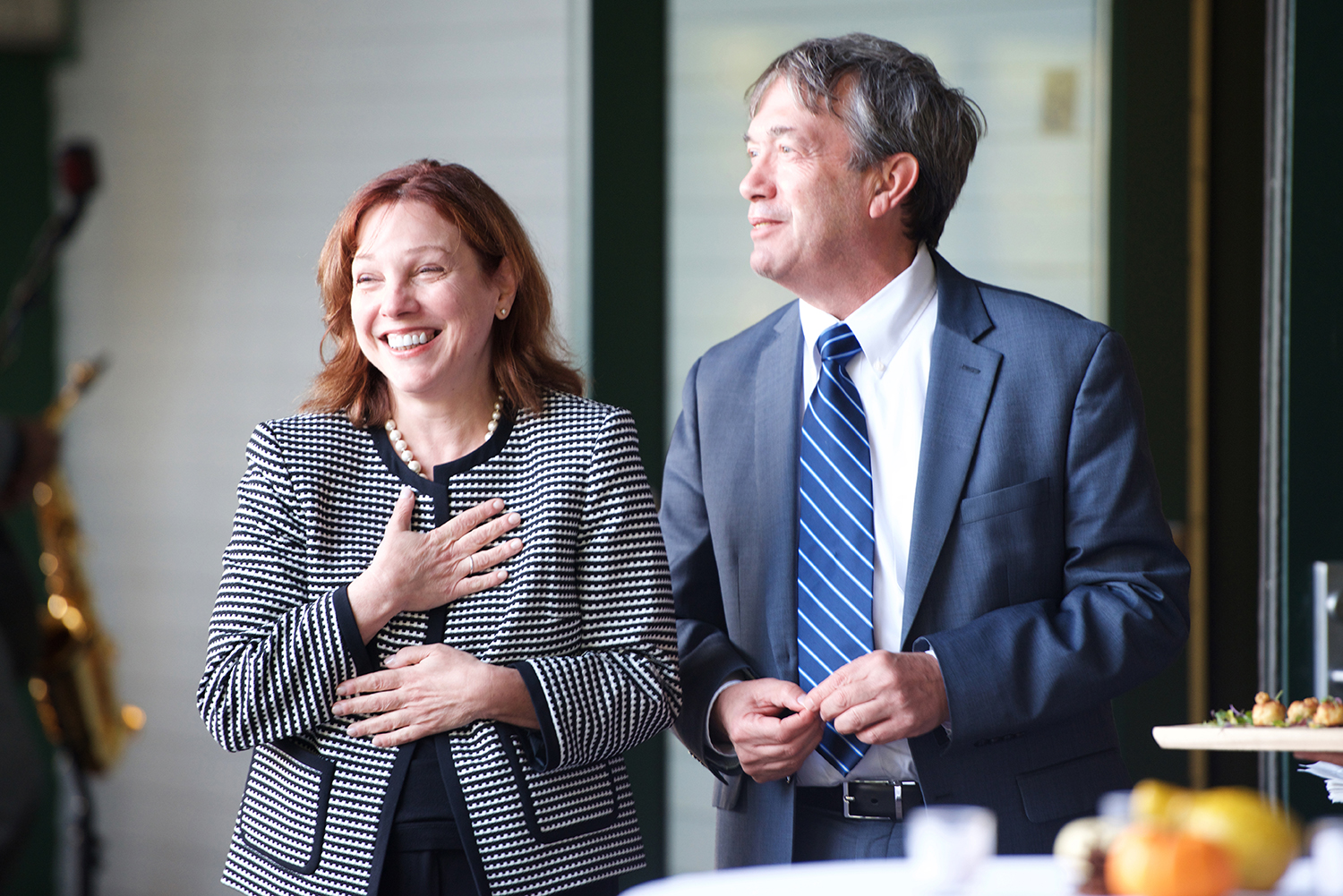……………………..
Our Donors are
Our Foundation.
……………………..
contents:
……………………..
2024 ANNUAL REPORT to Our Community

Our Donors are Our Foundation.
……………………..
As we mark our 100th year, the Hartford Foundation for Public Giving celebrates the enduring impact of our donors—the foundation of the meaningful change we see in Greater Hartford. In this report, we honor the individuals, families, and organizations who opened new funds in 2024, each one poised to contribute to the momentum of opportunity we see across our region. Through the generosity and foresight of these donors, we continue to work toward equity, support our region’s most vulnerable residents, and build a future where all can thrive.

Jay Williams
President and CEO

Dr. Mark Overmyer-Velázquez
Chair, Board of Trustees
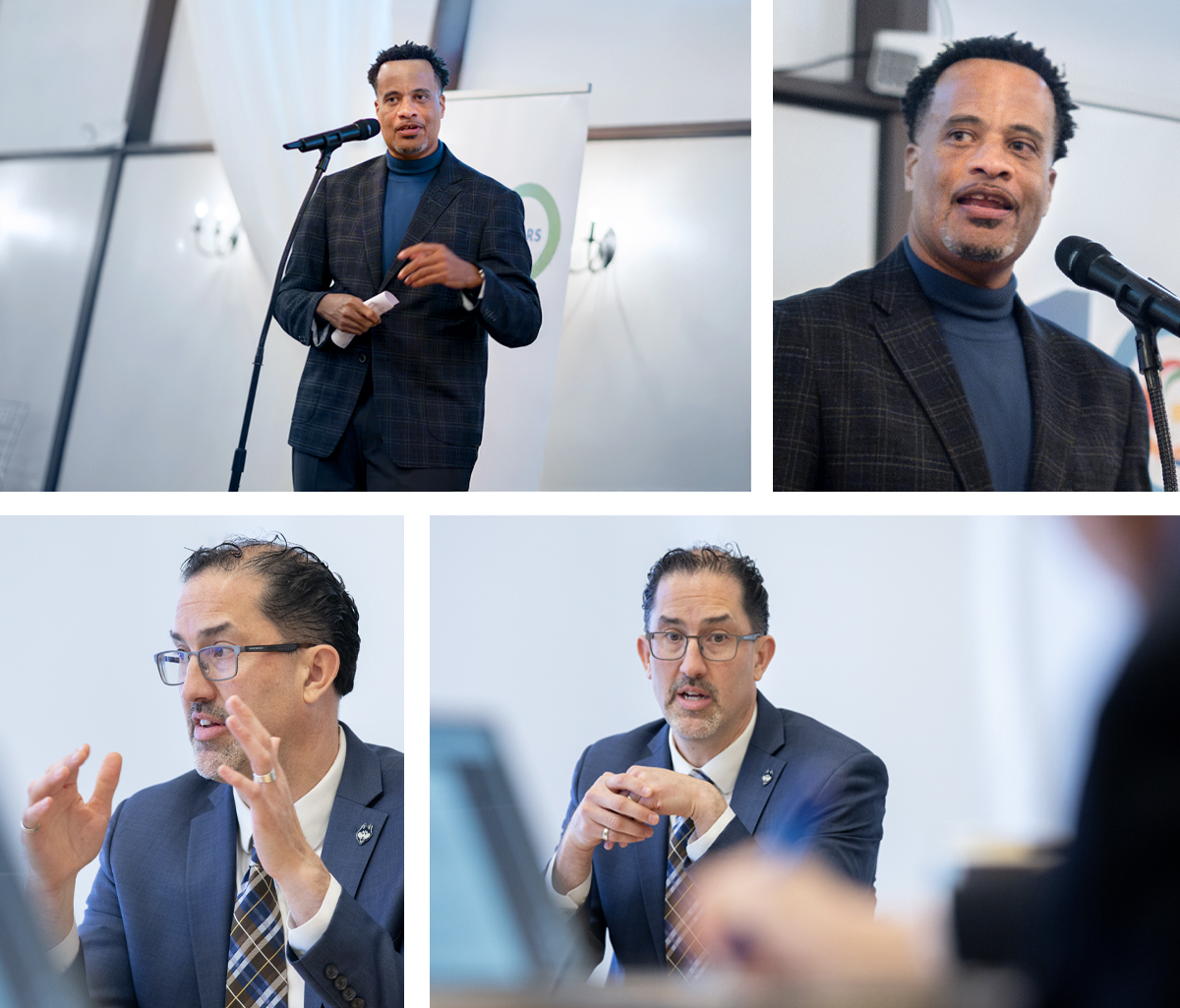
Thank you for a decade of service.
Andrew Worthington is a leader in every sense of the word. He served on the Foundation’s Board of Directors from 2015 through 2024, including the last two as Board Chair. Andrew and his wife Kathy have been members of all three giving circles, and he continues to serve on the Greater Futures Scholarship Fund campaign committee. We are grateful for Andrew’s commitment to our mission and his generous financial support.
Our Donors are Our Foundation.
……………………..
As we mark our 100th year, the Hartford Foundation for Public Giving celebrates the enduring impact of our donors—the foundation of the meaningful change we see in Greater Hartford. In this report, we honor the individuals, families, and organizations who opened new funds in 2024, each one poised to contribute to the momentum of opportunity we see across our region. Through the generosity and foresight of these donors, we continue to work toward equity, support our region’s most vulnerable residents, and build a future where all can thrive.

Jay Williams / President and CEO

Dr. Mark Overmyer-Velázquez / Chair

Thank you for a decade of service.
Andrew Worthington is a leader in every sense of the word. He served on the Foundation’s Board of Directors from 2015 through 2024, including the last two as Board Chair. Andrew and his wife Kathy have been members of all three giving circles, and he continues to serve on the Greater Futures Scholarship Fund campaign committee. We are grateful for Andrew’s commitment to our mission and his generous financial support.
DONOR-ADVISED FUND
Tao LaBossiere Artist Fund
……………………..
Connecticut native Tao LaBossiere was a beloved artist who made a name for himself by bringing creativity, color, and his unique artistic expression to the community through murals and projects across Greater Hartford.
……………………..
Tao dedicated his life to expanding Hartford’s arts scene. He lived and worked at Hartford ArtSpace, where he was an award-winning muralist, sculptor, and illustrator. Tao co-directed the Hartford ArtSpace Gallery and founded Art of Tao LaBossiere LLC with his wife, Amy. “He created his art with other people in mind,” said Amy. “It wasn’t about him creating some big visual that would get him accolades and fame. He wanted to create an experience… and that to me is public art.”
Tao’s untimely passing left an irreparable crack in Hartford’s artistic community. Yet, his work lives on throughout the Asylum Hill neighborhood, with murals like “Bee the Change” at the 224 EcoSpace and “Oneness of Being of Still Waters” at 289 Asylum St. — symbolizing Hartford’s evolving art culture and personal growth.
Tao frequently donated his pieces to fundraisers, mentored other artists, and imagined a Capital City filled with public art, especially large-scale murals and projects which he helped manifest, like his “Oak Leaf Throne.” Tao transformed a 180-year-old white oak into a 9.5-foot-tall sculpture, inviting Bushnell Park visitors to pause and appreciate their surroundings. More of Tao’s work can be seen at locations like the Hartford Public Library, the Vernon Diner, and Bear’s Smokehouse BBQ.
In remembrance of Tao’s love of art and his community, Amy established the Tao LaBossiere Artist Fund at the Hartford Foundation, which will support causes closest to his heart, including funds for local visual artists to pursue their creative passions.
“I had a meeting with the Hartford Foundation, and they made it so easy,” Amy said with a sigh of relief. “I wanted to continue his legacy, and I think part of that was his spirit pushing me saying, ‘Keep this going, Amy. Please keep this going for me,’ and I felt compelled.”
DESIGNATED ENDOWMENT FUND
Robert “Bobby” C. Garten Fund for the Ben Bronz Academy
……………………..
Moral philosopher Bernard Williams once said, “Man never made any material as resilient as the human spirit.” Perhaps there is no better example of true resiliency and transforming tragedy into positive impact than Robert “Bobby” Garten. On September 6, 2023, the beloved police officer, son, brother, and detective lost his life in the line of duty.
……………………..
Born and raised in Connecticut, Bobby and his brother William were students at West Hartford’s Ben Bronz Academy, a school that enables hundreds of students with learning disabilities to reach grade level and enter their next academic institution with confidence. Bobby attended the Academy from elementary through middle school. “He was a fun, loving guy who was serious about his work,” said Education Director Christina Lamphere. “He definitely had grit but always approached things with a sense of humor.”
After earning his associate degree at the New England Institute of Technology, Bobby followed in his father’s footsteps and began pursuing his dream of becoming a Hartford police officer; he graduated from the police academy in 2015.
To thank the school that equipped Bobby with the skills he carried through his education, the Garten family gave a gift to the Ben Bronz Academy to help give every child the chance to succeed. To amplify that gift, the Academy established the Robert “Bobby” C. Garten Fund for the Ben Bronz Academy at the Hartford Foundation, which will provide an annual grant to support the school’s operations and a way for others to make gifts. “We came to the Foundation because it was an excellent way to honor Bobby, while also expanding and offering more programs to our children,” said Richard Rubenstein, chair of the Academy’s board.
At the end of each academic year, Ben Bronz Academy holds a ceremony where a deserving middle school student is granted an achievement award. During his time at the Academy, Bobby won the award, and after his passing, it was renamed the Bobby Garten Memorial Award for Most Improved Middle School Student. It is granted to a resilient student who overcomes adversity to achieve their academic goals.
Bobby is survived by his parents Robert and Debra, his brother William, two nephews, and many other family members, friends, and police colleagues.
DESIGNATED ENDOWMENT FUND
Avon Land Trust Endowment Fund
……………………..
The freedom, fresh air, and opportunities for exploration and discovery that open land offers to a community can be transformative, particularly for children. If there’s one person who can attest to that, it is nature-lover Richard ‘Rick’ Dubiel.
……………………..
Rick grew up in Avon, surrounded by 100 acres of woods. He had great fun exploring every pond, tree, and wild animal that he encountered. Years later, that same mass of land in Rick’s backyard is developed and now barely reflects the vibrant environment he once knew.
Two generations later, Rick has a granddaughter who is being raised on the street where he grew up. His dream is for her to have the same opportunity to trek into the undisturbed woods. That dream inspired Rick to create the Avon Land Trust Endowment Fund at the Hartford Foundation. The fund will support the Trust and its mission to preserve and protect undeveloped land, enhance scenic beauty, and maintain wildlife habitats and historical resources in the Town of Avon. “I find it rewarding to create this endowment fund while I’m still alive so I can witness its effect,” said Rick, who is co-president of the Trust.
As an avid non-profit and community supporter, Rick has served as a Cub Scout Den Leader for Boy Scouts of America, a board member of the Avon High School Booster Club, and as part of the Avon Dollars for Scholars scholarship fund.
Since retiring as lead director of Clinical Insights and Analytics at Aetna, Rick spends most of his time collecting medical equipment to be sent overseas to developing countries, exploring with his granddaughter, and living on land that has been in his family for more than a century.
“Maynard Hazen, one of the founders of the Foundation, had a summer home in Avon, so it feels especially poignant to recognize Avon and its nature at the Foundation’s centennial. By preserving this land, we help ensure it is available to residents of Greater Hartford for the next hundred years and beyond.”
INDIVIDUAL SCHOLARSHIP ENDOWED FUND
NEAM Honors Founder Jerry Lynch through a Scholarship Fund
……………………..
New England Asset Management, Inc. (NEAM) recently celebrated its 40th anniversary. As part of this milestone, NEAM established the Gerard Thomas Lynch Fund to honor its late founder, Gerard “Jerry” Thomas Lynch.
……………………..
The people closest to Jerry described him as a remarkable man who led with kindness, honor, and integrity. Jerry treated everyone with respect, which left a lasting impression on those he met.
“Jerry knew that above all, in business and in life, the most important thing is how you treat people,” said William Rotatori, Chairman and Chief Executive Officer of NEAM. “His most enduring legacy is the culture Jerry nurtured, creating opportunities and fostering growth. We couldn’t think of a better way to honor his legacy than through a scholarship.”
The Gerard Thomas Lynch Scholarship honors Jerry’s vision and reflects NEAM’s dedication to making a meaningful impact in their local community. The fund seeks to raise money for college tuition for promising students in financial need in Greater Hartford, giving back to the community in which Jerry lived, worked and raised his family.
The memorial scholarship also furthers NEAM’s commitment to the Boys & Girls Clubs of Hartford by prioritizing applicants that have been active in the clubs.
NEAM continues to thrive and retains Jerry’s entrepreneurial spirit and dedication to treating employees and clients like family.

DONOR-ADVISED FUND
Edrick A. and Sonja B. Hall Fund
……………………..
If you have lived in Hartford’s Blue Hills neighborhood at any point during the last half century, you’ve heard the names Sonja and Edrick Hall. They poured support, guidance, love and mentorship into Blue Hills and all of Greater Hartford.
……………………..
Married for 60 years and counting, Sonja and Edrick moved to to Hartford – where they would raise their eight children – in 1971. A community pillar, Sonja served as director of The Village for Families and Children’s Family Resource Centers at both the former Annie Fisher Elementary School and Martin Luther King Jr., Elementary School. Much of the Hall family legacy is tied to the Blue Hills Civic Association, where Sonja served on the board for several years. Edrick, who is vocal about uplifting Black men, created the Black Men’s Society of Greater Hartford. Both Sonja and Edrick have been deeply involved in St. Monica’s and St. Martin’s Episcopal Churches. Sonja is also a member of the Artists Collective’s Board of Directors and a founding member of the Foundation’s Black Giving Circle.
Community engagement was a top priority in the Hall household and Sonja and Edrick’s children grew up as active members of the Artists Collective, church youth groups, summer camps, and other community-driven activities and organizations — extending the family tradition of uplifting the Blue Hills neighborhood. “We watched our parents live and give unselfishly to the neighborhood and community,” said Glendowlyn, the youngest of eight. “They taught us the value of service and this legacy continues through their children, grandchildren, and great-grandchildren.”
To continue and enhance the family’s community engagement, Sonja and Edrick have started a donor-advised fund at the Hartford Foundation. They intend to support education, arts and culture, and economic empowerment throughout the capital city.
Four of Sonja and Edrick’s children are now raising their families in Blue Hills, including Glendowlyn Thames, former Hartford City Council President and former Deputy Commissioner of the State Department of Economic and Community Development, as well as State Representative Joshua Hall who is an assistant principal at Weaver High School. “The Blue Hills community continues to impact the Hall family and we will continue to give back for future generations,” shared Representative Hall.
At the 2023 celebration of the Blue Hills Civic Association’s 60th Anniversary Gala, the Hall family received the Hartford Family Legacy Award.
AGENCY FUND
Habitat for Humanity North Central Connecticut Endowment Fund
……………………..
Karraine Moody has worked with Habitat for Humanity of North Central Connecticut for 20 of the organization’s 37 years. While the organization’s vision is that every man, woman, and child should have a simple, decent place to live remains at the core of the mission; how the team takes on this mandate has changed dramatically.
……………………..
“Since 2014, we’ve made so many program improvements,” said Ms. Moody. “In 2019 we began building zero-energy homes. We added A Brush with Kindness, a program that helps people repair their home’s exterior so families can remain in their homes and age in place. This program allows us to work with the elderly, veterans, and those with limited mobility. It is hard work, and we have to keep changing with the needs of our community, but it is making a difference.”
Ten years ago, Ms. Moody and her team began publishing a newsletter, making sure to include language about planned giving – charitable gifts created through estate planning – in each edition. “Talking about someone’s final wishes is sensitive,” she said. “At the same time, you cannot shy away from these conversations. We have sample language on our website and across our communication materials. It laid the groundwork for what came next.”
Over time, legacy gifts began playing a larger role in the organization’s financial picture. “We were seeing more frequent bequests, in larger amounts, and from people we never knew were interested in our work. Some individuals remembered the work of President Carter and sought us out. Others saw a home dedication in the news and decided to support us.”
“When we saw the increase in planned gifts, it became clear that we needed to upgrade our financial structure and create an endowment. It is important to treat these gifts in a way that is fitting, to extend the grace that was shown to us.”
“Establishing an agency fund (where the donor organization is also the beneficiary) with the Hartford Foundation was a natural choice. Our organizations share the same geography and the same commitment to serving people. The Foundation has a solid reputation for financial management, so our donors can feel comfortable making their gifts to a fund there. We began the conversation in 2023 and in 2024 our board approved the fund. It is working well for us.”
“I look at our agency fund as seed money for the future. Nonprofit organizations are vulnerable; the needs we address outlast the ups and downs of the economy. In a time when the cost of land and materials is increasing dramatically, it’s good to know that we will have a partner like the Hartford Foundation that will be with us for years to come.”
“Our clients have seen a meaningful impact in their lives, and in turn have been able to make a difference in their communities.”

DESIGNATED ENDOWMENT FUND
The Fred T. and Mary E. Blish Family Fund
……………………..
As founding members of the Little Theatre of Manchester (LTM), Fred and Mary Blish were staples in the town of Manchester’s theatre and art worlds. Mary worked behind the scenes as a musical director and costume designer while also serving on LTM’s board of directors. Fred, on the other hand, loved being in the spotlight. He appeared in more than 46 plays, directed 45 productions, and designed scenery for more than 100 shows.
……………………..
Fred left Manchester long enough to earn art degrees from Tufts University (BA) and Indiana University (MA) and serve in the Army Reserve. He worked in his father’s plumbing business and spent more than 30 years with United Technologies, but his passion was cemented in the arts. During his early years, he spent most of his summers working as an actor and set designer at the Somers Playhouse — known today as the Somers Village Players.
Mary, another Manchester native, graduated from high school in 1952 and earned a bachelor’s degree from the Hillyer College Hartford Conservatory of Music in 1956.
In addition to raising their children, David and Margaret, Mary played a significant role in establishing an art support system in Manchester, and she and Fred were key drivers for the restoration of Cheney Hall, the home of the LTM. They were also lifetime members of the Manchester Historical Society, the Manchester Arts Commission, and were awarded the Lifetime Achievement Award for their commitment to the arts.
As part of their estate planning, Fred, who died in 2010, and Mary, who died in 2023, had established a charitable gift annuity at the Hartford Foundation. The remainder of the annuity and a separate trust came to the Foundation upon their deaths, creating The Fred T. and Mary E. Blish Family Fund. This fund will make annual grants to the Blish’s designated beneficiaries: the Little Theatre of Manchester, the Manchester Scholarship Fund, Inc., and the Manchester Symphony Orchestra and Chorale.
UNRESTRICTED ENDOWMENT FUND
Alice Doreen and Harold C. Davis, Jr. Memorial Fund
……………………..
Alice (Doreen) and Harold Cheney Davis, Jr. were born, raised, and laid to rest in Connecticut, a sentence that, while accurate, misses the details of an eventful life together.
……………………..
Harold was born in Waterbury to parents Annie and Harold. After graduating from Windsor’s Loomis Chaffee School in 1940, Harold brought his academic aspirations to Massachusetts’ Worcester Polytechnic Institute. He captained a minesweeper in the U.S. Navy during World War II, and started an electric design company in Bloomfield formerly known as Electro-Flex Heat, Inc. — where he also ran as president. In 2017, Electro-Flex Heat, Inc was sold to Benchmark Thermal, a California-based manufacturer of industrial electric heating elements and controls.
Doreen grew up in West Hartford with her parents, Jessie and Alfred Forshaw, and graduated from Mount St. Joseph Academy in 1942. Many described her as a charming individual who always greeted everyone with a smile. Her passions lay in gardening and sewing.
The two married in the 1940s and spent the next decades raising their daughters, Carolyn and Kendra, and living an exciting and traditional New England lifestyle filled with lots of sailing.
To ensure financial stability for his wife and their surviving daughter, Kendra, Harold created a trust before his death in 2002. After Doreen’s death in 2019, and Kendra’s in 2024, the remainder of his trust moved to the Hartford Foundation to create an Unrestricted Endowed fund, the Alice Doreen and Harold C. Davis Jr. Memorial Fund. Grants from this fund will be made to support the Foundation’s core priorities in the Greater Hartford region, including basic human needs and the arts.
UNRESTRICTED ENDOWMENT FUND
Mary Jean Kilfoil Memorial Fund
……………………..
Mary Jean Kilfoil lived a life filled with travel and lasting personal relationships. Born in 1929 in New Britain, Jean grew up across from what is now the campus of Central Connecticut State University (CCSU), where she later attended college. Equipped with a mathematics degree, Jean launched her teaching career at the Long Lane School, a former center for girls with behavioral and emotional challenges in Middletown.
……………………..
Amid the school’s challenging environment, Jean leveraged her ability to relate to and support people of different backgrounds and circumstances. This allowed her to gain acceptance from the girls, who she would subsequently invite to family dinners. Years later, Jean switched careers and landed at the Aetna Insurance Company working in the actuarial department, but she never forgot the girls who turned from students to friends.
Ever the adventurous spirit, Jean alternated between exciting journeys through Europe and the Middle East and the quiet of her family’s West Hartford home where she enjoyed the company of her faithful four-legged friend and all the dogs in the neighborhood.
Jean made gifts to several nonprofit organizations in Greater Hartford that reflected her commitment to care for others. Jean passed away in 2023, but her generous spirit lives on through the Mary Jean Kilfoil Memorial Fund. Created in 2024, the fund will support the Hartford Foundation’s regional priorities, including providing for basic human needs such as food and shelter.
She spent her final years at The McAuley retirement home with her companion, Varita Williams.

DONOR-ADVISED FUND
Gallery For Good Fund
……………………..
“We’ve all heard about ‘the starving artist,’” said Farmington native, entrepreneur, and philanthropist Kate Emery. “But that doesn’t mean artists don’t have a passion for generosity and making a difference. So, we give through one thing we have: our work.”
……………………..
After a career as the founder of IT services firm and social enterprise The Walker Group, and a nonprofit supporting social enterprise in the state, reSET, Kate now spends her days in her art studio, capturing the beauty and stillness of nature. For her, painting is not just a source of peace — it’s a way to give back. Since retiring, she has donated 50% of all art sales to a donor-advised fund at the Hartford Foundation to support local organizations working to make the world a better place for us all.
In 2024, she began imagining how she might invite other artists to do the same. The result is Gallery For Good — a platform for creatives who want to get their work into the hands of art lovers while supporting causes they care about. Through online and in-person exhibits, a percentage of each sale supports local nonprofits. In its early collaborations, Gallery For Good has raised funds for the Farmington Land Trust, the Farmington River Watershed Association, and others.
This summer, the group will host a new online exhibit: Summer in New England, running June 1 through August 31, in partnership with the Farmington Land Trust. The show will highlight the work of local artists inspired by the light, joy, and natural beauty of summertime in the Northeast. Sales from the exhibit will support both the artists and the Land Trust’s mission to protect and preserve open space.
“We’re still dreaming about what Gallery For Good might become — a regional collaboration, a hub for artist-philanthropists, maybe even a series of pop-up shows or community partnerships,” Kate shared. “We’re adding artists, experimenting with models, and staying grounded in the joy of giving.”
DONOR-ADVISED FUND
Deborah Rothstein Fund
……………………..
Sometimes when you meet someone, you immediately know that person is special. That was the case for Bob and Frankie Goldfarb when they met Deborah Rothstein a quarter-century ago. Initially as the development lead for the Jewish Community Foundation of Greater Hartford and then in a similar role at the Hartford Foundation for more than a decade, Deborah forged a close relationship – personal and professional – with the Goldfarbs.
……………………..
“She just has a very calm, natural way of doing things and taking it step-by-step,” said Bob Goldfarb. “She has a very far-reaching understanding that this is not a one-year fundraising project, it’s a 10 or 20-year project.”
When Deborah decided to retire from her role at the Foundation in 2024 to focus on caring for her parents, the Goldfarbs were among the first people she told. Right away, they knew they wanted to honor her years of service to the Greater Hartford community by establishing the Deborah Rothstein Fund at the Foundation.
“Frankie and I really wanted to create a fund where Deborah would have the ability to make grants to the things that are important to her,” said Bob, “It’s just our way to allow her to stay engaged beyond her personal resources.”
“Bob Goldfarb has been a friend and mentor for 25 years, and I’m so honored that he would recognize me in this way,“ said Deborah. “It’s exciting for me to be on the opposite side of the donor advised fund process after spending so many years working with individuals, families, and companies to open these charitable funds.”
Deborah plans to support the strategic vision of the Hartford Foundation as well as programs that encourage interfaith conversations and foster greater understanding of local, national, and international issues. As a former clinician, she is also interested in supporting programs that address trauma, particularly for children and families.
For the Goldfarbs’ part, they hope this can serve as a model for others to create funds in someone’s honor or memory, to continue that person’s good works.
Thank you, Deborah, for your years of service to the Foundation and our community.
DONOR-ADVISED FUND
Tao LaBossiere Artist Fund
……………………..
Connecticut native Tao LaBossiere was a beloved artist who made a name for himself by bringing creativity, color and his unique artistic expression to the community through murals and projects across Greater Hartford.
……………………..
Tao dedicated his life to expanding Hartford’s arts scene. He lived and worked at Hartford ArtSpace, where he was an award-winning muralist, sculptor, and illustrator. Tao co-directed the Hartford ArtSpace Gallery and founded Art of Tao LaBossiere LLC with his wife, Amy. “He created his art with other people in mind,” said Amy. “It wasn’t about him creating some big visual that would get him accolades and fame. He wanted to create an experience… and that to me is public art.”
Tao’s untimely passing left an irreparable crack in Hartford’s artistic community. Yet, his work lives on throughout the Asylum Hill neighborhood, with murals like “Bee the Change” at the 224 EcoSpace and “Oneness of Being of Still Waters” at 289 Asylum St. — symbolizing Hartford’s evolving art culture and personal growth.
Tao frequently donated his pieces to fundraisers, mentored other artists, and imagined a Capital City filled with public art, especially large-scale murals and projects which he helped manifest, like his “Oak Leaf Throne.” Tao transformed a 180-year-old white oak into a 9.5-foot-tall sculpture, inviting Bushnell Park visitors to pause and appreciate their surroundings. More of Tao’s work can be seen at locations like the Hartford Public Library, the Vernon Diner, and Bear’s Smokehouse BBQ.
In remembrance of Tao’s love of art and his community, Amy established the Tao LaBossiere Artist Fund at the Hartford Foundation, which will support causes closest to his heart, including funds for local visual artists to pursue their creative passions.
“I had a meeting with the Hartford Foundation, and they made it so easy,” Amy said with a sigh of relief. “I wanted to continue his legacy, and I think part of that was his spirit pushing me saying, ‘Keep this going, Amy. Please keep this going for me,’ and I felt compelled.”
DESIGNATED ENDOWMENT FUND
Robert “Bobby” C. Garten Fund for the Ben Bronz Academy
……………………..
Moral philosopher Bernard Williams once said, “Man never made any material as resilient as the human spirit.” Perhaps there is no better example of true resiliency and transforming tragedy into positive impact than Robert “Bobby” Garten. On September 6, 2023, the beloved police officer, son, brother, and detective lost his life in the line of duty.
……………………..
Born and raised in Connecticut, Bobby and his brother William were students at West Hartford’s Ben Bronz Academy, a school that enables hundreds of students with learning disabilities to reach grade level and enter their next academic institution with confidence. Bobby attended the Academy from elementary through middle school. “He was a fun, loving guy who was serious about his work,” said Education Director Christina Lamphere. “He definitely had grit but always approached things with a sense of humor.”
After earning his associate degree at the New England Institute of Technology, Bobby followed in his father’s footsteps and began pursuing his dream of becoming a Hartford police officer; he graduated from the police academy in 2015.
To thank the school that equipped Bobby with the skills he carried through his education, the Garten family gave a gift to the Ben Bronz Academy to help give every child the chance to succeed. To amplify that gift, the Academy established the Robert “Bobby” C. Garten Fund for the Ben Bronz Academy at the Hartford Foundation, which will provide an annual grant to support the school’s operations and a way for others to make gifts. “We came to the Foundation because it was an excellent way to honor Bobby, while also expanding and offering more programs to our children,” said Richard Rubenstein, chair of the Academy’s board.
At the end of each academic year, Ben Bronz Academy holds a ceremony where a deserving middle school student is granted an achievement award. During his time at the Academy, Bobby won the award, and after his passing, it was renamed the Bobby Garten Memorial Award for Most Improved Middle School Student. It is granted to a resilient student who overcomes adversity to achieve their academic goals.
Bobby is survived by his parents Robert and Debra, his brother William, two nephews, and many other family members, friends, and police colleagues.
DESIGNATED ENDOWMENT FUND
Avon Land Trust Endowment Fund
……………………..
The freedom, fresh air, and opportunities for exploration and discovery that open land offers to a community can be transformative, particularly for children. If there’s one person who can attest to that, it is nature-lover Richard ‘Rick’ Dubiel.
……………………..
Rick grew up in Avon, surrounded by 100 acres of woods. He had great fun exploring every pond, tree, and wild animal that he encountered. Years later, that same mass of land in Rick’s backyard is developed and now barely reflects the vibrant environment he once knew.
Two generations later, Rick has a granddaughter who is being raised on the street where he grew up. His dream is for her to have the same opportunity to trek into the undisturbed woods. That dream inspired Rick to create the Avon Land Trust Endowment Fund at the Hartford Foundation. The fund will support the Trust and its mission to preserve and protect undeveloped land, enhance scenic beauty, and maintain wildlife habitats and historical resources in the Town of Avon. “I find it rewarding to create this endowment fund while I’m still alive so I can witness its effect,” said Rick, who is co-president of the Trust.
As an avid non-profit and community supporter, Rick has served as a Cub Scout Den Leader for Boy Scouts of America, a board member of the Avon High School Booster Club, and as part of the Avon Dollars for Scholars scholarship fund.
Since retiring as lead director of Clinical Insights and Analytics at Aetna, Rick spends most of his time collecting medical equipment to be sent overseas to developing countries, exploring with his granddaughter, and living on land that has been in his family for more than a century.
“Maynard Hazen, one of the founders of the Foundation, had a summer home in Avon, so it feels especially poignant to recognize Avon and its nature at the Foundation’s centennial. By preserving this land, we help ensure it is available to residents of Greater Hartford for the next hundred years and beyond.”
INDIVIDUAL SCHOLARSHIP ENDOWED FUND
NEAM Honors Founder Jerry Lynch through a Scholarship Fund
……………………..
New England Asset Management, Inc. (NEAM) recently celebrated its 40th anniversary. As part of this milestone, NEAM established the Gerard Thomas Lynch Fund to honor its late founder, Gerard “Jerry” Thomas Lynch.
……………………..
The people closest to Jerry described him as a remarkable man who led with kindness, honor, and integrity. Jerry treated everyone with respect, which left a lasting impression on those he met.
“Jerry knew that above all, in business and in life, the most important thing is how you treat people,” said William Rotatori, Chairman and Chief Executive Officer of NEAM. “His most enduring legacy is the culture Jerry nurtured, creating opportunities and fostering growth. We couldn’t think of a better way to honor his legacy than through a scholarship.”
The Gerard Thomas Lynch Scholarship honors Jerry’s vision and reflects NEAM’s dedication to making a meaningful impact in their local community. The fund seeks to raise money for college tuition for promising students in financial need in Greater Hartford, giving back to the community in which Jerry lived, worked and raised his family.
The memorial scholarship also furthers NEAM’s commitment to the Boys & Girls Clubs of Hartford by prioritizing applicants that have been active in the clubs.
NEAM continues to thrive and retains Jerry’s entrepreneurial spirit and dedication to treating employees and clients like family.
DONOR-ADVISED FUND
Edrick A. and Sonja B. Hall Fund
……………………..
If you have lived in Hartford’s Blue Hills neighborhood at any point during the last half century, you’ve heard the names Sonja and Edrick Hall. They poured support, guidance, love and mentorship into Blue Hills and all of Greater Hartford.
……………………..
Married for 60 years and counting, Sonja and Edrick moved to Hartford in 1971 where they raised their eight children. A community pillar, Sonja served as the director of The Village for Families and Children’s Family Resource Centers at both the former Annie Fisher Elementary School and the former Martin Luther King, Jr. Elementary School. Much of the Hall family legacy is tied to the Blue Hills Civic Association, where Sonja served on the board for several years. Edrick, who is vocal about uplifting Black men, created the Black Men’s Society of Greater Hartford. Both Sonja and Edrick have been deeply involved in St. Monica’s and St. Martin’s Episcopal Churches. Sonja is also a member of the Artists Collective’s Board of Directors.
Community engagement was a top priority in the Hall household and Sonja and Edrick’s children grew up as active members of the Artist Collective, church youth groups, summer camps, and other community-driven activities and organizations — extending the family tradition of uplifting the Blue Hills neighborhood. “We watched our parents live and give unselfishly to the neighborhood and community,” said Glendowlyn, the youngest of eight. “They taught us the value of service and this legacy continues through their children, grandchildren, and great-grandchildren.”
To continue and enhance the family’s community engagement, Sonja and Edrick have started a donor-advised fund at the Hartford Foundation. They intend to support education, arts and culture, and economic empowerment throughout the capital city.
Four of Sonja and Edrick’s children are now raising their families in Blue Hills, including Glendowlyn Thames, former Hartford City Council President and former Deputy Commissioner of the State Department of Economic and Community Development, as well as State Representative Joshua Hall who is an assistant principal at Weaver High School. “The Blue Hills community continues to impact the Hall family and we will continue to give back for future generations,” shared Representative Hall.
At the 2023 celebration of the Blue Hills Civic Association’s 60th Anniversary Gala the Hall Family received the Hartford Family Legacy Award.
AGENCY FUND
Habitat for Humanity North Central Connecticut Endowment Fund
……………………..
Karraine Moody has worked with Habitat for Humanity of North Central Connecticut for 20 of the organization’s 37 years. While the organization’s vision is that every man, woman, and child should have a simple, decent place to live remains at the core of the mission; how the team takes on this mandate has changed dramatically.
……………………..
“Since 2014, we’ve made so many program improvements,” said Ms. Moody. “In 2019 we began building zero-energy homes. We added A Brush with Kindness, a program that helps people repair their home’s exterior so families can remain in their homes and age in place. This program allows us to work with the elderly, veterans, and those with limited mobility. It is hard work, and we have to keep changing with the needs of our community, but it is making a difference.”
Ten years ago, Ms. Moody and her team began publishing a newsletter, making sure to include language about planned giving – charitable gifts created through estate planning – in each edition. “Talking about someone’s final wishes is sensitive,” she said. “At the same time, you cannot shy away from these conversations. We have sample language on our website and across our communication materials. It laid the groundwork for what came next.”
Over time, legacy gifts began playing a larger role in the organization’s financial picture. “We were seeing more frequent bequests, in larger amounts, and from people we never knew were interested in our work. Some individuals remembered the work of President Carter and sought us out. Others saw a home dedication in the news and decided to support us.”
“When we saw the increase in planned gifts, it became clear that we needed to upgrade our financial structure and create an endowment. It is important to treat these gifts in a way that is fitting, to extend the grace that was shown to us.”
“Establishing an agency fund (where the donor organization is also the beneficiary) with the Hartford Foundation was a natural choice. Our organizations share the same geography and the same commitment to serving people. The Foundation has a solid reputation for financial management, so our donors can feel comfortable making their gifts to a fund there. We began the conversation in 2023 and in 2024 our board approved the fund. It is working well for us.”
“I look at our agency fund as seed money for the future. Nonprofit organizations are vulnerable; the needs we address outlast the ups and downs of the economy. In a time when the cost of land and materials is increasing dramatically, it’s good to know that we will have a partner like the Hartford Foundation that will be with us for years to come.”
“Our clients have seen a meaningful impact in their lives, and in turn have been able to make a difference in their communities.”
DESIGNATED ENDOWMENT FUND
The Fred T. and Mary E. Blish Family Fund
……………………..
As founding members of the Little Theatre of Manchester (LTM), Fred and Mary Blish were staples in the town of Manchester’s theatre and art worlds. Mary worked behind the scenes as a musical director and costume designer while also serving on LTM’s board of directors. Fred, on the other hand, loved being in the spotlight. He appeared in more than 46 plays, directed 45 productions, and designed scenery for more than 100 shows.
……………………..
Fred left Manchester long enough to earn art degrees from Tufts University (BA) and Indiana University (MA) and serve in the Army Reserve. He worked in his father’s plumbing business and spent more than 30 years with United Technologies, but his passion was cemented in the arts. During his early years, he spent most of his summers working as an actor and set designer at the Somers Playhouse — known today as the Somers Village Players.
Mary, another Manchester native, graduated from high school in 1952 and earned a bachelor’s degree from the Hillyer College Hartford Conservatory of Music in 1956.
In addition to raising their children, David and Margaret, Mary played a significant role in establishing an art support system in Manchester, and she and Fred were key drivers for the restoration of Cheney Hall, the home of the LTM. They were also lifetime members of the Manchester Historical Society, the Manchester Arts Commission, and were awarded the Lifetime Achievement Award for their commitment to the arts.
As part of their estate planning, Fred, who died in 2010, and Mary, who died in 2023, had established a charitable gift annuity at the Hartford Foundation. The remainder of the annuity and a separate trust came to the Foundation upon their deaths, creating The Fred T. and Mary E. Blish Family Fund. This fund will make annual grants to the Blish’s designated beneficiaries: the Little Theatre of Manchester, the Manchester Scholarship Fund, Inc., and the Manchester Symphony Orchestra and Chorale.
UNRESTRICTED ENDOWMENT FUND
Alice Doreen and Harold C. Davis, Jr. Memorial Fund
……………………..
Alice (Doreen) and Harold Cheney Davis, Jr. were born, raised, and laid to rest in Connecticut, a sentence that, while accurate, misses the details of an eventful life together.
……………………..
Harold was born in Waterbury to parents Annie and Harold. After graduating from Windsor’s Loomis Chaffee School in 1940, Harold brought his academic aspirations to Massachusetts’ Worcester Polytechnic Institute. He captained a minesweeper in the U.S. Navy during World War II, and started an electric design company in Bloomfield formerly known as Electro-Flex Heat, Inc. — where he also ran as president. In 2017, Electro-Flex Heat, Inc was sold to Benchmark Thermal, a California-based manufacturer of industrial electric heating elements and controls.
Doreen grew up in West Hartford with her parents, Jessie and Alfred Forshaw, and graduated from Mount St. Joseph Academy in 1942. Many described her as a charming individual who always greeted everyone with a smile. Her passions lay in gardening and sewing.
The two married in the 1940s and spent the next decades raising their daughters, Carolyn and Kendra, and living an exciting and traditional New England lifestyle filled with lots of sailing.
To ensure financial stability for his wife and their surviving daughter, Kendra, Harold created a trust before his death in 2002. After Doreen’s death in 2019, and Kendra’s in 2024, the remainder of his trust moved to the Hartford Foundation to create an Unrestricted Endowed fund, the Alice Doreen and Harold C. Davis Jr. Memorial Fund. Grants from this fund will be made to support the Foundation’s core priorities in the Greater Hartford region, including basic human needs and the arts.
UNRESTRICTED ENDOWMENT FUND
Mary Jean Kilfoil Memorial Fund
……………………..
Mary Jean Kilfoil lived a life filled with travel and lasting personal relationships. Born in 1929 in New Britain, Jean grew up across from what is now the campus of Central Connecticut State University (CCSU), where she later attended college. Equipped with a mathematics degree, Jean launched her teaching career at the Long Lane School, a former center for girls with behavioral and emotional challenges in Middletown.
……………………..
Amid the school’s challenging environment, Jean leveraged her ability to relate to and support people of different backgrounds and circumstances. This allowed her to gain acceptance from the girls, who she would subsequently invite to family dinners. Years later, Jean switched careers and landed at the Aetna Insurance Company working in the actuarial department, but she never forgot the girls who turned from students to friends.
Ever the adventurous spirit, Jean alternated between exciting journeys through Europe and the Middle East and the quiet of her family’s West Hartford home where she enjoyed the company of her faithful four-legged friend and all the dogs in the neighborhood.
Jean made gifts to several nonprofit organizations in Greater Hartford that reflected her commitment to care for others. Jean passed away in 2023, but her generous spirit lives on through the Mary Jean Kilfoil Memorial Fund. Created in 2024, the fund will support the Hartford Foundation’s regional priorities, including providing for basic human needs such as food and shelter.
She spent her final years at The McAuley retirement home with her companion, Varita Williams.
DONOR-ADVISED FUND
Gallery For Good Fund
……………………..
“We’ve all heard about ‘the starving artist,’” said Farmington native, entrepreneur, and philanthropist Kate Emery. “But that doesn’t mean artists don’t have a passion for generosity and making a difference. So, we give through one thing we have: our work.”
……………………..
After a career as the founder of IT services firm and social enterprise The Walker Group, and a nonprofit supporting social enterprise in the state, reSET, Kate now spends her days in her art studio, capturing the beauty and stillness of nature. For her, painting is not just a source of peace — it’s a way to give back. Since retiring, she has donated 50% of all art sales to a donor-advised fund at the Hartford Foundation to support local organizations working to make the world a better place for us all.
In 2024, she began imagining how she might invite other artists to do the same. The result is Gallery For Good — a platform for creatives who want to get their work into the hands of art lovers while supporting causes they care about. Through online and in-person exhibits, a percentage of each sale supports local nonprofits. In its early collaborations, Gallery For Good has raised funds for the Farmington Land Trust, the Farmington River Watershed Association, and others.
This summer, the group will host a new online exhibit: Summer in New England, running June 1 through August 31, in partnership with the Farmington Land Trust. The show will highlight the work of local artists inspired by the light, joy, and natural beauty of summertime in the Northeast. Sales from the exhibit will support both the artists and the Land Trust’s mission to protect and preserve open space.
“We’re still dreaming about what Gallery For Good might become — a regional collaboration, a hub for artist-philanthropists, maybe even a series of pop-up shows or community partnerships,” Kate shared. “We’re adding artists, experimenting with models, and staying grounded in the joy of giving.”
DONOR-ADVISED FUND
Deborah Rothstein Fund
……………………..
Sometimes when you meet someone, you immediately know that person is special. That was the case for Bob and Frankie Goldfarb when they met Deborah Rothstein a quarter-century ago. Initially as the development lead for the Jewish Community Foundation of Greater Hartford and then in a similar role at the Hartford Foundation for more than a decade, Deborah forged a close relationship – personal and professional – with the Goldfarbs.
……………………..
“She just has a very calm, natural way of doing things and taking it step-by-step,” said Bob Goldfarb. “She has a very far-reaching understanding that this is not a one-year fundraising project, it’s a 10 or 20-year project.”
When Deborah decided to retire from her role at the Foundation in 2024 to focus on caring for her parents, the Goldfarbs were among the first people she told. Right away, they knew they wanted to honor her years of service to the Greater Hartford community by establishing the Deborah Rothstein Fund at the Foundation.
“Frankie and I really wanted to create a fund where Deborah would have the ability to make grants to the things that are important to her,” said Bob, “It’s just our way to allow her to stay engaged beyond her personal resources.”
“Bob Goldfarb has been a friend and mentor for 25 years, and I’m so honored that he would recognize me in this way,“ said Deborah. “It’s exciting for me to be on the opposite side of the donor advised fund process after spending so many years working with individuals, families, and companies to open these charitable funds.”
Deborah plans to support the strategic vision of the Hartford Foundation as well as programs that encourage interfaith conversations and foster greater understanding of local, national, and international issues. As a former clinician, she is also interested in supporting programs that address trauma, particularly for children and families.
For the Goldfarbs’ part, they hope this can serve as a model for others to create funds in someone’s honor or memory, to continue that person’s good works.
……………………..
Thank you, Deborah, for your years of service to the Foundation and our community.



